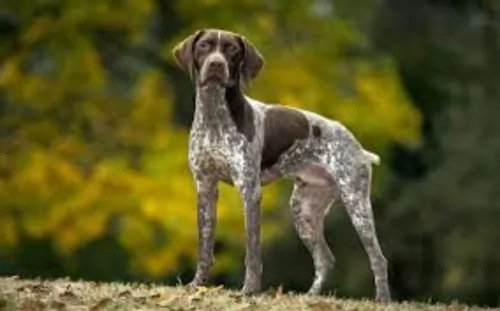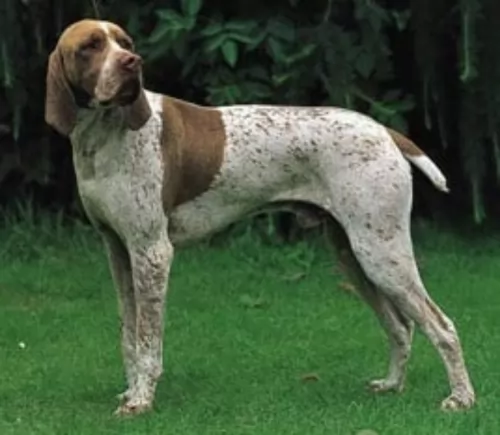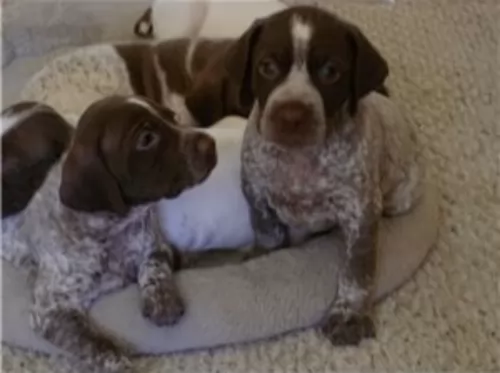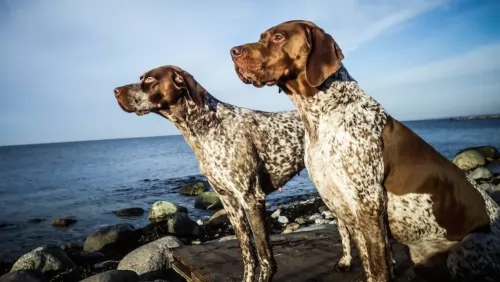 Petzlover
Petzlover Both Braque Francais (Gascogne Type) and Grand Gascon Saintongeois are originated from France. Both Braque Francais (Gascogne Type) and Grand Gascon Saintongeois are having almost same height. Both Braque Francais (Gascogne Type) and Grand Gascon Saintongeois are having almost same weight. Both Braque Francais (Gascogne Type) and Grand Gascon Saintongeois has almost same life span. Braque Francais (Gascogne Type) may have more litter size than Grand Gascon Saintongeois. Both Braque Francais (Gascogne Type) and Grand Gascon Saintongeois requires Low Maintenance.
Both Braque Francais (Gascogne Type) and Grand Gascon Saintongeois are originated from France. Both Braque Francais (Gascogne Type) and Grand Gascon Saintongeois are having almost same height. Both Braque Francais (Gascogne Type) and Grand Gascon Saintongeois are having almost same weight. Both Braque Francais (Gascogne Type) and Grand Gascon Saintongeois has almost same life span. Braque Francais (Gascogne Type) may have more litter size than Grand Gascon Saintongeois. Both Braque Francais (Gascogne Type) and Grand Gascon Saintongeois requires Low Maintenance.
 The Braques Français – Gascogne – is a hunting dog from southern France’s Gascony region. Known also as the French Gascony Pointer, this dog has descended from Spanish and Italian Pointers. The dog was saved from extinction at the turn of the 20th century.
The Braques Français – Gascogne – is a hunting dog from southern France’s Gascony region. Known also as the French Gascony Pointer, this dog has descended from Spanish and Italian Pointers. The dog was saved from extinction at the turn of the 20th century.
There are actually two breeds of Braque français, with the other being somewhat smaller and known as Braque français, type Pyrénées. Whichever one you have, they are popular hunting dogs in France. The first breed club was established in 1850.
 Known also as the Virelade, the Grand Gascon Saintongeois hails from the Saintongeois region of France, being a newish addition to the hunting dog breed.
Known also as the Virelade, the Grand Gascon Saintongeois hails from the Saintongeois region of France, being a newish addition to the hunting dog breed.
The Saintongeois hound and the Grand Blue de Gascogne are the ancestors of this scentdog as these two breeds themselves, are exceptional hunters. The Grand Gascon Saintongeois is a large dog and favored by the French nobility for its ability to hunt.
After the French Revolution the popularity of the breed waned. It was Baron Joseph de Carayon-LaTour who tried to revive the Saintongeois Hound. The dogs were mated with the Grand Bleu de Gascogne and were so outstanding that breeding was continued. The breed that was created is the Grand Gascon Saintongeois which we know today.
It was in January 1993 that the Grand Gascon Saintongeois was officially recognized by the United Kennel Club.
 The Braque Francais is a dog which looks much like the German Short-haired Pointer. The Braque Francais (Gascogne) is a large breed dog, standing roughly 56 – 69cm. Weight is most times dependent on height, but the average weighs between 35 and 55 pounds. The dog is attractively lean and muscular and the tails have always been docked, although rules and regulations see the breed with a long tail these days. The natural tail of the Braque Francais is medium length. The eyes of this breed are brown or yellow and the ears are medium in length and floppy. The coat of the Gascogne is short and dense and in two colors – white and chestnut patching and mottling.
The Braque Francais is a dog which looks much like the German Short-haired Pointer. The Braque Francais (Gascogne) is a large breed dog, standing roughly 56 – 69cm. Weight is most times dependent on height, but the average weighs between 35 and 55 pounds. The dog is attractively lean and muscular and the tails have always been docked, although rules and regulations see the breed with a long tail these days. The natural tail of the Braque Francais is medium length. The eyes of this breed are brown or yellow and the ears are medium in length and floppy. The coat of the Gascogne is short and dense and in two colors – white and chestnut patching and mottling.
The dog is a keen tracker and is an excellent game and gun dog with some of them requiring more training than others. Training and socialization makes the Braque Francais an excellent, obedient pet who is eager to please and he is considered to be easily trainable, learning quickly. He loves his human family and is noted for his gentle, friendly nature, and he therefore makes and excellent family pet where there are children and other pets.
 The Grand Gascon Saintongeois is a large, well built breed of dog that looks strong and robust. His head is strong and covered with loose skin that forms wrinkles around the cheeks. He stands at 61-73cm and weighs 30 to 35kg.
The Grand Gascon Saintongeois is a large, well built breed of dog that looks strong and robust. His head is strong and covered with loose skin that forms wrinkles around the cheeks. He stands at 61-73cm and weighs 30 to 35kg.
He has straight, long legs. He has a short, smooth coat which is white with black patches. Sometimes you'll also find a speckled or ticked pattern. There'll be tan dots over the eyes.
The eyes are brown, the nose black and the long, thin textured ears are low on the dogs head and also well back on the skull. The tail is long.
He is known for his deep voice to voice an opinion. He is a loving, friendly, courageous and affectionate breed with a well balanced temperament, making him a splendid pet. He is also intelligent and so he won't battle at all to learn some rules. Training and socialization will be good for him even though he is such an amicable dog already, but then he just becomes extra obedient.
 The attractive Braque Francais is a calm, contented dog who is also affectionate, social and intelligent. He is already a well mannered dog but will do even better with training and socialization. However, Braque Francais don’t take well to aggressive training and done the wrong way, the dog can end up being timid and confused.
The attractive Braque Francais is a calm, contented dog who is also affectionate, social and intelligent. He is already a well mannered dog but will do even better with training and socialization. However, Braque Francais don’t take well to aggressive training and done the wrong way, the dog can end up being timid and confused.
Wanting to please and being an intelligent dog, training should be fun, lighthearted but firm. In exchange you’re going to have an awesome friend from this wonderful, loving dog breed.
 Your Grand Gascon Saintongeois is a true hunting dog breed and valued for his hunting prowess. He has another side to him though and is gentle, loving and calm with his human family.
Your Grand Gascon Saintongeois is a true hunting dog breed and valued for his hunting prowess. He has another side to him though and is gentle, loving and calm with his human family.
He makes a wonderful family companion, getting on well with children as well as pets in the home. He may show a bit of aggression to strangers and this is why training and socialization works so well with him as it helps him behave well around family and strangers.
Training is never a problem as he is an intelligent dog. He is an energetic dog and won't fit well into city life in tiny properties, also because of his tendency to bark when bored. He fits well into country life or large properties.
When you provide your large pet with good food, a warm place to sleep, exercise and plenty of love and attention, the Grand Gascon Saintongeois is going to turn out to be one of the most loyal, affectionate pets you can imagine.
 You won’t find many health issues with this active breed but nonetheless hip and joint issues will need to be watched. If you are considering a Braque Français puppy, you’ll want to be selective in choosing a responsible breeder. A healthy puppy with the right environment, can get to up to 15 years of age.
You won’t find many health issues with this active breed but nonetheless hip and joint issues will need to be watched. If you are considering a Braque Français puppy, you’ll want to be selective in choosing a responsible breeder. A healthy puppy with the right environment, can get to up to 15 years of age.
Ectropion and entropion in dogs affect their eyelids. Ectropion is where the eyelids roll outward, whereas entropion is where the eyelids curve inward, irritating the eye. Because visual and skeletal problems occur in this breed, it can be recommended that owners have their pets tested by both the Canine Eye Registration Foundation as well as the Orthopedic Foundation for Animals.
 Your Grand Gascon Saintongeois is a robust dog, who with good care can reach up to 14 years of age. You're not going to be running to the vet often with this strong looking dog, but even so, there are one to two problems that you'll want to look out for.
Your Grand Gascon Saintongeois is a robust dog, who with good care can reach up to 14 years of age. You're not going to be running to the vet often with this strong looking dog, but even so, there are one to two problems that you'll want to look out for.
Long-eared dogs are more susceptible to canine ear infections. The symptoms of the infection will be dependent on how severe it is. Certainly your dog may experience pain and you'll see him shaking his head and pawing at his ear. If both ears are affected by inflammation, he may even walk in a wobbly fashion and the infection could lead to deafness. It is imperative that he get to the vet as soon as possible.
This is where the ball and socket joint of the hip is malformed. It results in a joint rubbing and grinding. It can lead to loss of function of the hip joints. It is a common skeletal disease in young or old dogs, small or large dogs and in both males and females.
Large dogs are more commonly affected though with hip dysplasia which can see arthritis developing too. Your dog will display decreased activity and difficulty with standing up after lying down. Veterinary intervention will be required.
 Brushing the coat twice a week will get rid of loose hairs and maintain the sheen of the coat. Also, as a floppy eared breed, attention should be given to the ears to prevent infections. He will also need to have his teeth brushed with dog toothpaste and brush to prevent the build-up of damaging plaque and his nails will also require a clipping if they don’t manage to wear down naturally.
Brushing the coat twice a week will get rid of loose hairs and maintain the sheen of the coat. Also, as a floppy eared breed, attention should be given to the ears to prevent infections. He will also need to have his teeth brushed with dog toothpaste and brush to prevent the build-up of damaging plaque and his nails will also require a clipping if they don’t manage to wear down naturally.
Daily activity will be needed for this dog and he will want a walk every day. He certainly isn’t a dog you can leave indoors or outside in your backyard day after day. Any activities that require physical exertion will be good because they are exceptional athletes. If you are a cyclist or a runner, take him with you – he’ll love it.
Your Braque Francais loves energetic activities and for this he will require an excellent nutrient-rich diet. Nutrient-rich dog foods are higher in protein and fat and lower in carbohydrates. It’s important to check out the carbohydrate content in commercial dog foods to avoid those one high in carbohydrates.
Your vet can always advise you on a good quality food and you can always give him your own home-prepared foods which include rice, vegetables and meat. Certainly include some raw meat into his diet every now and then to avoid skin problems. Fresh, cool water must be available to him night and day.
 These large dogs with their short smooth coats have very little grooming needs. Regular brushing twice a week will remove dead hair and also ensure the good condition of the coat.
These large dogs with their short smooth coats have very little grooming needs. Regular brushing twice a week will remove dead hair and also ensure the good condition of the coat.
He has long ears and these will need to be checked regularly to avoid ear infections. It will be a good idea to learn how to clean the ears and to do it in such a way as to avoid damaging them. Signs of ear infection include redness, discharge, irritation and bad odor.
Following the feeding instructions on the packaging of top quality kibble, provide your Grand Gascon Saintongeois with at least 2 meals a day. To steer away from the monotony of kibble every day, mix in some raw meat from time to time, and also include some cooked brown rice, chicken and vegetables as a tasty treat. Fresh, cool water should always be easily accessible to him.